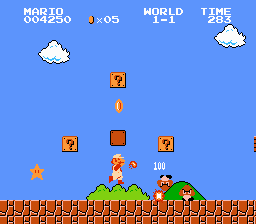Right then.
My geek love for the New Yorker and my geek love for video games recently converged under the title Master of Play, an article about legendary game designer Shigeru Miyamoto, creator of Super Mario Bros. and many other classics.
Well, to be completely accurate, I’m not a video game geek per se. I’m more of a fantasy/modding/computer roleplaying game geek. Still, the article was fascinating as a portrait of a seminal figure in video games, and more importantly, contained a satisfying amount of general game design discussion. If you haven’t done so, you should read the whole thing online. I found this description of Super Mario Bros. particularly interesting:
This, I would argue, doesn’t describe most RPGs.
The game had just fifteen or twenty dynamics in it—how the mushrooms work, how the blocks react when you hit them—yet they combined in such a way to produce a seemingly limitless array of experiences and moves, and to provide opportunities for an alternative, idiosyncratic style of play, which brings to mind nothing so much as chess. Will Wright cited the theory of emergence—the idea that complex systems arise out of the interaction of several simple things.
Oh, there’s no doubt that RPGs are complex. In fact, to the uninitiated, they can be intimidatingly so. However, the sort of complexity RPGs feature is typically engineered from the ground up. Everything in an RPG – at least, everything relevant to gameplay – has a statistical profile. Interactions such as the casting of a spell on an enemy play out according to predetermined formulas. And much of the time, underlying it all is actually a pretty simple system.
Take weapons, for example. When deciding which weapon to use, we’re typically given a bewildering number of factors to weigh – damage, speed, accuracy, size (can I dual wield it?), effectiveness when combined with skills, etc. However, when you crunch the numbers, an optimal choice often emerges. Then, once you’ve done the math and decided on your weapon, the complexity falls into the lap of the random number generator. You either hit the monster or you don’t. You do a little damage or a lot. In most cases, there’s not more to it than that.
Is this a problem? Probably not for the build meisters, for whom character creation is the whole game. Also probably not for those who enjoy RPGs as interactive cinema and don’t care much about game mechanics.
But me? I would love to see more “organic” RPGs where unpredictable events and offbeat play styles are allowed. That was one of the addictive qualities of Baldur’s Gate and the other Infinity Engine games. A morale failure or Chaos spell could lead to interesting and amusing situations in combat. And, in the case of Baldur’s Gate 2 at least, you could waltz around as an invisible Jester and use your bard song to make your enemies fight each other. That, I believe, is what you call an “idiosyncratic style of play.”
(I promise, in the future I will try not to be That Guy who always hearkens back to Baldur’s Gate as an example of everything that was once good and right with RPGs. Even if it is.)
Unfortunately, I’m pretty sure these qualities would be considered undesirable by most game developers today. I can certainly see how they could make playtesting more interesting. But I, for one, would be willing to accept more bugs if it meant playing an RPG where things could happen that nobody – not even the developers – could have predicted.



No comments:
Post a Comment